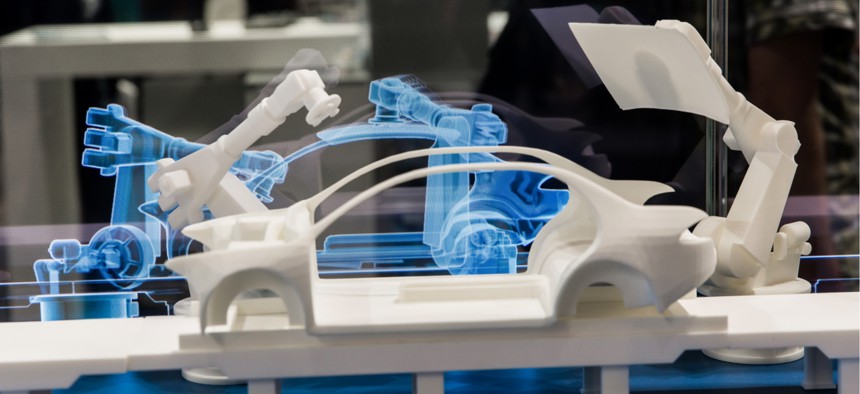The Future of Work Requires We Rethink Public Policy

McKinsey has found that even if technology stopped improving today, we could automate 45 percent of activities people are paid to do. Alexander Tolstykh / Shutterstock.com
COMMENTARY | Washington has not adequately modernized federal laws; that leaves state and local leaders, who are uniquely positioned to help bridge the gap between public policy and sustainable work for families.
Academics have referred to our current economic transformation as a revolution and a “second machine age,” comparing today’s era to changes as dramatic as the shift from a world of primarily agricultural work to one of industrial and service jobs accompanied by mass migrations to urban (and suburban) communities.
When we can carry computers in our pockets more powerful than the PCs of 30 years ago and when massive assembly lines have been largely replaced by automation, it should catalyze a dramatic change in public policy. People are being left behind without the skills or resources to navigate career paths, and McKinsey has found that even if technology stopped improving today, we could automate 45 percent of activities people are paid to do.
Washington has not adequately modernized its federal laws governing various issues, such as unemployment insurance, family leave or benefits for independent workers. The recently passed federal law to fund workforce development (The Workforce Innovation Opportunity Act) draws closer to the target, but it should still be improved.
For instance, it continues to reward programs that train people to become part-time employees, even if those jobs cannot sustain a household or are unlikely to last for an extended period. Our policy reforms must not only provide training, but also do so in a way that workers are neither underinsured or underemployed. We must focus holistically on the impact to our households as a guide to designing policy solutions for our varied workforce.
Instead of seeking to move the clock backward, we must seize the opportunities of the future, while meeting people where they are today. We should not tell Americans that they have no place in the evolving economy; our job is to ensure access to the jobs of tomorrow’s economy with a safety net that protects people from the hazards of our fast-changing world.
Because of their proximity to American families, state and local leaders are uniquely positioned to help bridge the gap between public policy and sustainable work for families. For this reason, we have launched a first-of-its-kind effort, drawing from the NewDEAL’s forward-looking state and local officials across the country, to produce policy recommendations that address the future of work.
Our response cannot be limited to one-off programs. We need a comprehensive vision to address the challenges of the modern economy—one that looks at geographic disparities, labor markets, and a broad range of inequalities. Finally, we must make sure that the jobs of the new economy enable people to sustain their lives.
For the aforementioned reasons, our recommendations will address challenges like access to lifelong learning that allows students and workers to acquire skills for well-paying jobs whether they are just starting out in the job market or need to change careers because of automation. We have seen the importance of these efforts in our states. By 2020, 70 percent of Maryland jobs and more than 60 percent of Texas jobs are expected to require post-secondary education or training.
To that end, we recommend solutions, such as savings accounts—similar to tax-advantaged 529 plans used for college—that are geared to short-term training and retraining programs. Implementation of these accounts would be combined with just-in-time skill development and training programs focused on placing workers in competitive, growing industries with labor shortages, as well as career pathway programs though which high schools partner with local businesses and higher education.
Overall, the NewDEAL Future of Work policy group is focusing on a vision that addresses:
1. Skills and training: how to create career pipelines and training opportunities that can adapt to the changing job market. That includes a recognition that, while higher education needs to be part of the solution, the answer isn’t only traditional 4-year, or even 2-year degrees.
2. A modern social safety net: how to make benefits portable and widely available so people can adapt their careers, and even move to new jobs, while feeling secure about their health care, retirement, and other basic needs.
3. Entrepreneurship, business incentives and innovation: how to partner with the private sector to incentivize entrepreneurship, especially in areas where business startups are declining in an era of capital concentration in major cities, including an interim step of incentivizing businesses (with tax breaks) to employ people whose jobs have gone away with virtual employment opportunities.
4. Infrastructure: how to create employment opportunities for much needed critical infrastructure across the county.
5. Parent-friendly workplaces: how to ensure equitable workplace situations and parental leave policies so that being a parent is frictionless in the workplace economy.
We look forward to presenting recommendations for leaders across the country to adapt to the changing nature of work at the annual NewDEAL Leaders conference from November 28-30 in Washington, D.C. Recommendations will also be posted at newdealleaders.org. Following their release, we will dig deeper into the ideas and offer resources to help implement them in ways that meet the needs to specific communities.
Amanda K. Edwards serves as city council member, at-large position #4, in Houston, Texas. Andrew Platt is a Democratic member of the Maryland House of Delegates, representing District 17
NEXT STORY: The Stunningly Positive Impact of Asking Your Co-Workers: “How Are You?”





